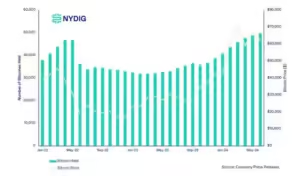UK Court Sentences Woman to Jail for Laundering $10 Million in Bitcoin Linked to Alleged $5.6 Billion Fraud

Quick Take:
- Jian Wen, a UK-Chinese citizen, sentenced to six years and eight months for laundering 150 BTC.
- The laundered bitcoin is part of a broader investment fraud totaling $5.6 billion.
- Wen claims innocence, stating she laundered funds for another individual without knowledge of their origin.
- Bitcoin price stands at $69,077.30 with a 3.04% increase in the past 24 hours.
Main Article:
The Southwark Crown Court in London has made headlines in the crypto world as it sentenced Jian Wen, a 42-year-old with dual citizenship in the UK and China, to a jail term of six years and eight months. Her crime? Laundering 150 BTC, amounting to approximately $10.4 million at current market rates. Wen’s case is intricately tied to a massive investment fraud scheme, where authorities seized a staggering 61,000 BTC valued at approximately $4.22 billion, all linked to a broader purported fraud totaling $5.6 billion.
Wen’s involvement in the laundering operation allegedly spanned from 2017 to 2022. During this period, she claims to have acted as a conduit for funds on behalf of another individual, a Chinese woman whom she identified as the “mastermind” behind the operation. However, Wen maintains that she had no knowledge of the true origin of the funds she was laundering. Notably, the court did not find her culpable for participating in the broader fraud scheme.
Prior to her involvement in the illicit activities, Wen’s occupation was that of a food delivery worker, indicating a significant shift in her circumstances and activities leading up to her arrest and subsequent conviction.
Bitcoin’s market performance at the time of Wen’s sentencing adds another layer of context to this case. As of May 24, the cryptocurrency was trading at $69,077.30, reflecting a 3.04% increase in value over the past 24 hours. This surge in price underscores the ongoing volatility and allure of cryptocurrencies, despite the regulatory challenges and criminal activities often associated with them.
Wen’s case serves as a stark reminder of the legal risks and consequences involved in engaging with cryptocurrencies, particularly in activities related to money laundering and fraudulent schemes. As governments and regulatory bodies worldwide grapple with the complexities of digital assets, cases like these highlight the urgent need for robust measures to combat illicit activities within the crypto space.
In conclusion, Jian Wen’s sentencing sheds light on the intricate interplay between cryptocurrencies, financial crime, and the judicial system. As the crypto landscape continues to evolve, stakeholders must remain vigilant in addressing illicit activities while fostering innovation and legitimacy within the industry.



